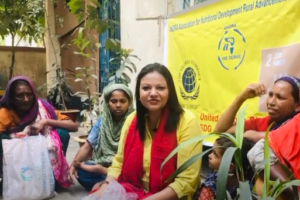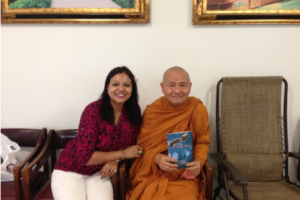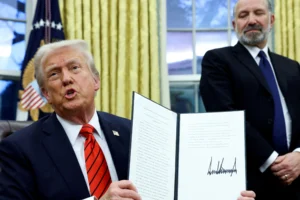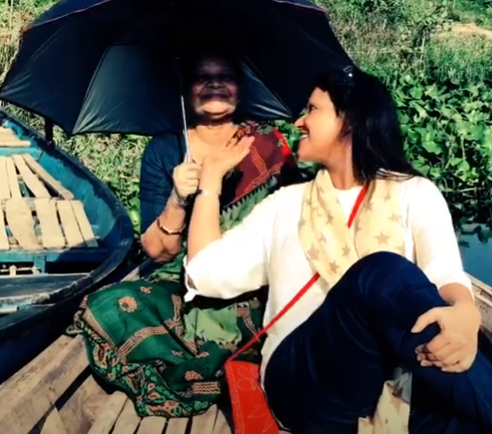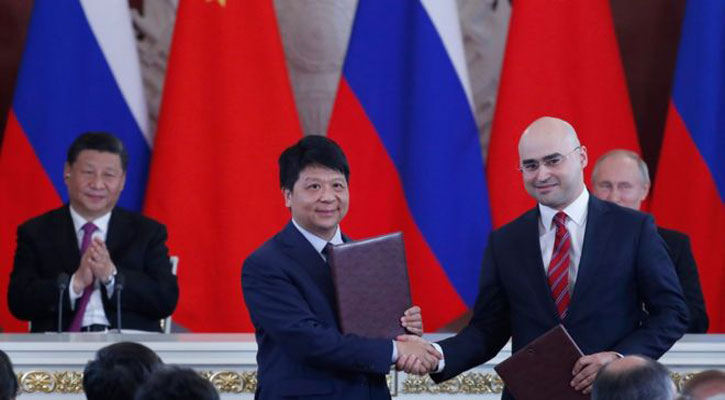Their cities are running out of water. Droughts are driving their friends off their farms. Mosquitoes are showing up in places where they had never seen them. The future of the planet seems so uncertain that they confess to being afraid and anxious.
From Melbourne, Australia, to La Paz, Boliva, and London to Cape Town, South Africa, young people took part in a historic day of protests Friday to goad world leaders into addressing what they call the climate crisis. Rallies were held in an estimated 150 countries and across the United States.
Who are these young protest organizers? What is driving them? What do they want?
KAMPALA, UGANDA
Leah Namugerwa, 15
Two things prompted her to walk out of school on a Friday this past February: The example of Greta Thunberg’s one-girl strike in Sweden and what she regards to be a near-total neglect of climate change issues by those in charge of her country. “I noticed adults were not willing to offer leadership, and I chose to volunteer myself,” Leah Namugerwa said. “Environmental injustice is injustice to me.”
Her teacher was encouraging at first, but not after some school parents complained. She has not been punished for her protests, but the school marks her absent for every day she is out protesting, sometimes by herself on the side of a road, dressed in her school uniform.
Uganda, she said, is no stranger to the impact of climate change. Hotter days, longer droughts, unpredictable rains and mosquitoes where there were none. The protests give her some hope.
“Fridays for Future grew from one person to millions, from one country to the whole world,” Leah said. “The increasing number of climate strikers and activists are giving me hope that climate action is within our reach.”
She was supposed to be in New York this weekend for the United Nations Youth Climate Summit, but could not get a US visa and will not be able to come.
MUMBAI, INDIA
Nikhil Kalmegh, 24
Nikhil Kalmegh sees climate change affecting the basic necessities of life across his country.
“We’re buying drinking water, people are dying of air pollution, there’s water crises, from Delhi to Chennai,” he said. In some places there’s not enough water to drink, let alone water needed to farm. “The poor are facing the worst impacts of climate change. Farmers will be the first to go extinct.”
Two things pulled him into climate activism: a dire report from the Intergovernmental Panel on Climate Change, warning about the urgent need to curb emissions, and news of Greta’s solo strike. “This is our terrifying world, already at 1 Celsius warming,” he said. “The Paris Agreement was in 2015, but it looks like no politicians are making a concerted effort.”
The first time he joined a climate protest was last March, during the last Global Day of Action.
He wants India to declare a climate emergency. “If the government makes climate change their No. 1 priority, and stops deforestation in the name of development, only then do we stand a chance,” he said. Most Indians make a living on the land. The country has a long coastline, and 1.3 billion citizens, the world’s second largest population, after China.
“For the economy, we’re increasing industrialization but we have to focus on air, water and food,” he said. “We don’t take this threat as seriously as we should.”
MELBOURNE, AUSTRALIA
Freya Brown, 16
The thing that pulled Freya Brown into her first climate strike late last year was realizing that it’s not a faraway problem, and that it’s not equal. “Seeing people being affected right now,” she said, “which is so unfair.”
She sees it all around her. Not so far away are the Pacific islands, whose very existence is threatened by sea rise. Recurrent droughts are making life tough for her friends in the Australian countryside. And then there’s the stress that her peers feel, in her city, about what future they can expect to have.
It’s impacting people disproportionately, she said. “We need to be supporting and trying to help those most affected. And realizing some countries have a lot more power and ability to make change.”
She wants her own country to stop new fossil fuel projects. At the moment that looks unlikely. Australia is among the world’s biggest coal producers, and its new government has given the go-ahead to open a large new coal basin in the northeast.
CAPE TOWN, SOUTH AFRICA
Ruby Sampson, 18, and Ayakha Melithafa, 17
Ruby Sampson and Ayakha Melithafa wanted to be interviewed together as members of the African Climate Alliance. They do not skip school every Friday. “It’s not ethical,” Ayakha said, to call on kids to skip school when their parents sacrifice so much to pay school fees.
This Friday is an exception. “It’s not just for the privileged kids whose mummies can drive them back and forth,” Ruby said. Buses have been rented, with the help of environmental groups, to ferry children to and from the strike.
Ruby and Ayakha see the impact of climate change in the successive droughts that have struck southern Africa, and particularly in the water crisis that struck their city last year.
The tap water was contaminated in Ayakha’s neighborhood, and when her brother drank it, unknowingly, he suffered from diarrhea for a week. Ruby’s family, like all Cape Town families, had to strictly ration water. “I couldn’t take showers, I was drinking less water, clothing had to be worn over and over again,” Ruby said.
“We are living the way people are afraid to live when climate crisis hits in privileged communities,” Ayakha said.
They want an immediate moratorium on the extraction of coal, oil and gas in South Africa. Ayakha has a broader demand for the UN summit next week: She wants world leaders to see the problem globally, not through their own parochial lens. “This is our world, not ‘I have my country. You have your country,’” Ayakha said.
LONDON
Elijah McKenzie-Jackson, 15
When he went to his first climate strike in February, Elijah McKenzie-Jackson was not sure it was his place to “stand up and speak.” He was only 15, after all.
He should be worrying about exams. But then he met a child younger than him, and watched her burst into tears because she was afraid she would not have anywhere to live when she grew up.
“It’s so out of this world that children are so terrified of literally being on this planet, being able to survive,” he said. “I thought enough is enough. It’s time to do something now.”
Elijah’s country is among those with one of the most ambitious targets in the world to cut emissions and produce, on balance, zero greenhouse gas emissions by 2050. He does not think it’s soon enough. “I would like politicians and policymakers to actually hear students on the street who are terrified. Our planet is dying and I want them to find a solution. I want to go net zero by 2030.”
He tries to keep his fear at bay. “I am terrified for the future,” Elijah said. “I feel like if I think about it too long, I won’t be able to do what I do.”
LA PAZ, BOLIVIA
Adriana Salazar, 19
Adriana Salazar’s family belongs to the Aymara indigenous community from Guaqui in the Bolivian Andes. Farmers there have long managed the occasional drought, she said, but they could not cope during the last one, in 2016, when Bolivia suffered its worst drought in decades. Rural people ended up moving into already cramped cities. “It didn’t rain when it should have. The cold season was stronger and that damaged the crops too,” she said. “The people who lived off the land can’t live off it anymore.”
This year, there are forest fires, some of the worst in her country’s history. “I don’t know what world my kids will live in. I don’t know what’s going to happen in 10 years,” she said. “The kids, the indigenous communities, pregnant women, they’ll see the effects while the higher classes will avoid the worst of it.”
She wants rich countries to provide more money for the Green Climate Fund. As a law student, she wants world leaders to recognize the rights of the planet, as they would recognize the rights of individuals and nation-states. “Recognize Mother Earth as a subject of law, and not an object of law,” she said.
NEW YORK
Jamie Margolin, 17
Jamie Margolin’s climate activism began long before Greta sat outside the Swedish Parliament. Her trigger moment, she said, was the US presidential election in 2016. She needed to help make the planet livable for her generation.
“At that moment I was, like, the leaders elected are not going to be the ones,” she said.
She joined a local environmental group in her hometown, Seattle, then founded her own called This Is Zero Hour and then one day in April, walked out of school with a sign she made in art class: “School Strike for the Amazon,” it read.
She cares about the Amazon not just because it’s the lungs of the planet. The forest stretches into Colombia, her mother’s home country. And it is the Amazon that looms large in her mind when she thinks of the UN summit. “What I need them when they come together on Sept 23 is to immediately halt all deforestation altogether.”
The other day, before traveling to New York for the protests there, she was cornered by classmates feeling stressed. “Are we going to make it?” they asked. She said she had no certainty to offer, only a conviction to do whatever it takes to try. “It’s like the door is slamming and we’re trying to run in through that door right before it slams shut.”






